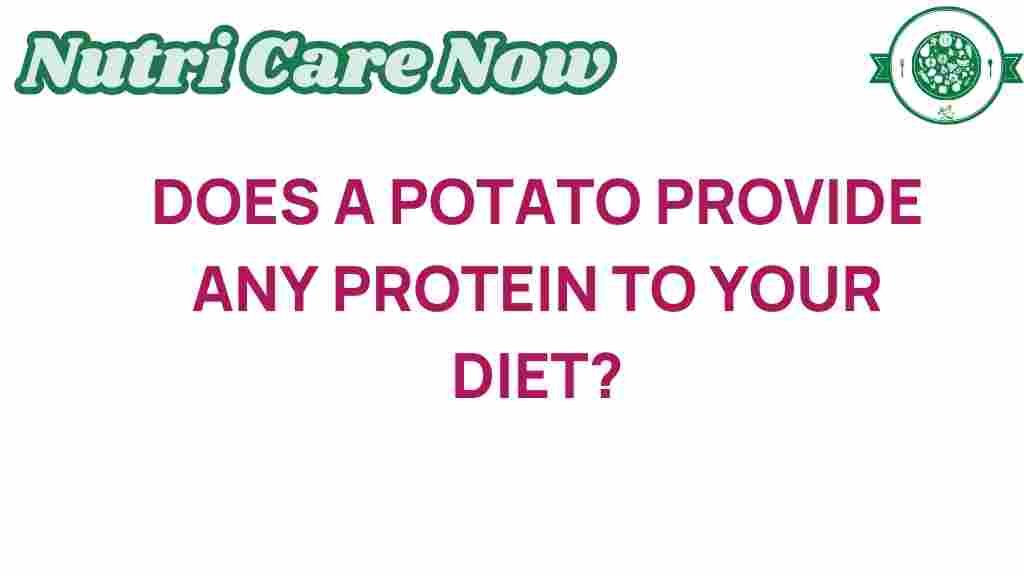Unraveling the Protein Potential of Potatoes in Your Diet
When we think about the ideal components of a healthy diet, protein-rich foods often take center stage. However, many people overlook the potato nutrition profile, specifically its potential as a source of dietary protein. In this article, we will explore the protein content in potatoes, debunk common food myths, and provide a comprehensive understanding of how potatoes can fit into a balanced plant-based diet.
Understanding Potato Nutrition
Potatoes are commonly classified as a starchy vegetable, often associated with carbohydrates rather than proteins. However, this perspective fails to recognize the nutritional benefits potatoes can offer. Let’s delve into the nutrition facts of potatoes:
- Calories: Approximately 130 per medium-sized potato
- Carbohydrates: About 30 grams
- Dietary Fiber: Roughly 2 grams
- Protein: Approximately 3 grams
While potatoes are not the highest in protein compared to other sources, they do contain a notable amount. When considering a plant-based diet, it’s essential to recognize the cumulative protein intake from various sources, including potatoes.
The Role of Protein in Your Diet
Protein is a vital macronutrient that plays several crucial roles in the body, including:
- Building and repairing tissues
- Supporting immune function
- Producing enzymes and hormones
- Providing energy
Incorporating various protein sources into your meals ensures that you meet your daily protein needs. This is particularly important for those following a plant-based diet, where protein sources may differ from traditional animal products.
Exploring Protein Sources Beyond Meat
While meat, fish, and dairy are well-known protein sources, there are numerous vegetable protein options available that can complement your diet. Some notable plant-based protein sources include:
- Legumes (beans, lentils, chickpeas)
- Nuts and seeds (almonds, chia seeds, hemp seeds)
- Whole grains (quinoa, barley, oats)
- Dairy alternatives (tofu, tempeh, plant-based milk)
Adding potatoes to this list can enhance your meals, providing not just carbohydrates but also a modest amount of protein.
Carbs vs Protein: Finding Balance
Many individuals struggle with the balance between carbohydrates and protein in their diets, often favoring one over the other. Potatoes are an excellent example of how carbs vs protein can coexist in a single food source. By understanding how to integrate potatoes into your meals, you can achieve a balanced nutrient intake.
Cooking Methods That Preserve Nutritional Value
To maximize the nutritional value of potatoes, consider the following cooking methods:
- Baking: Retains most nutrients while adding flavor.
- Boiling: A quick method but may cause some nutrient loss.
- Steaming: Preserves more nutrients compared to boiling.
- Mashed: A delicious way to enjoy potatoes, just be mindful of added ingredients.
Each method can impact the overall nutrient content, so choose wisely based on your dietary goals.
Combining Potatoes with Other Protein Sources
To boost the protein content of your meals, consider pairing potatoes with other protein sources. Here are some delicious combinations:
- Potato and black bean salad
- Twice-baked potatoes with cottage cheese
- Potato curry with lentils
- Mashed potatoes topped with sautéed mushrooms and chickpeas
These combinations not only enhance the protein profile but also add flavor and variety to your meals.
Debunking Food Myths About Potatoes and Protein
There are many food myths surrounding potatoes that can lead to misconceptions about their nutritional value. Let’s address a few:
Myth 1: Potatoes Are Just Empty Carbs
While potatoes are high in carbohydrates, they are far from being empty calories. They provide essential vitamins, minerals, and some protein, making them a valuable part of a balanced diet.
Myth 2: You Can’t Get Enough Protein from a Plant-Based Diet
Many believe that plant-based diets lack sufficient protein. However, with a variety of plant sources, including potatoes, legumes, and nuts, it’s entirely possible to meet your protein needs.
Myth 3: Eating Potatoes Will Make You Gain Weight
Weight gain is not solely determined by one food but rather by overall dietary patterns and caloric intake. Moderation and balance are key. Potatoes can be part of a healthy diet when consumed mindfully.
Incorporating Potatoes into Your Healthy Diet
Now that we’ve established the protein potential of potatoes, how can you incorporate them into your daily meals effectively? Follow these simple steps:
Step 1: Choose the Right Potatoes
There are various types of potatoes, including:
- Russet: High in starch, great for baking and frying.
- Red: Waxy texture, ideal for boiling and salads.
- Yukon Gold: Creamy texture, perfect for mashing.
Choose according to the dish you plan to prepare.
Step 2: Experiment with Flavors
Add herbs, spices, and healthy fats to enhance the flavor of potatoes. Consider options like:
- Olive oil and rosemary
- Garlic and parsley
- Chili powder and lime
These additions not only elevate taste but also contribute to a range of health benefits.
Step 3: Monitor Portion Sizes
While potatoes are healthy, portion control is essential. A medium-sized potato is generally a good serving size for most meals.
Troubleshooting Tips for Cooking Potatoes
Cooking potatoes can sometimes lead to undesirable results. Here are some tips to improve your potato dishes:
- If your mashed potatoes are too lumpy, use a potato ricer for a smoother texture.
- Overcooked potatoes can become mushy; aim for fork-tender consistency.
- If baking potatoes, ensure they are dry before oiling to achieve crispy skin.
Conclusion: Embracing the Protein Potential of Potatoes
In conclusion, potatoes are more than just a carbohydrate source; they hold potential as a part of your protein intake in a healthy diet. By debunking food myths and understanding the nutritional benefits of potatoes, you can make informed choices that enhance your meals. Consider potatoes as a versatile ingredient that can fit into a balanced plant-based diet. So, the next time you’re planning your meals, don’t forget to include this humble vegetable.
For more information on plant-based nutrition, visit this resource. Additionally, check out our guide on the best protein sources for a well-rounded diet.
This article is in the category Diet and created by NutriCareNow Team
